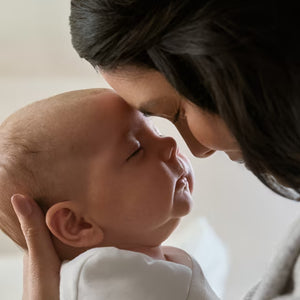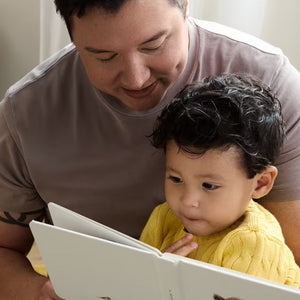Are you curious about sleep training? I know you may have heard rumors one way or another, and it can be hard to know who to trust. Let me walk you through some sleep training myths that I hear and share the evidence-based truth that speaks to each.
Myth: Sleep training causes high stress for babies and damages your connection with your baby.
Fact: Research(1) shows that infant cortisol (stress hormone) levels are actually lower after sleep training (likely because lack of consolidated sleep increases cortisol levels). Research(1) also shows the infant-caregiver attachment remains unchanged with sleep training. Some parents actually report an increase in bonding because they feel more well-rested.
Myth: Sleep training is a major cause of mental health issues.
Fact: Research demonstrates that sleep training can be an effective way to prioritize the mental health of both parents and babies. Consolidated sleep decreases the incidence of depression(2,9) and anxiety in parents. When babies sleep well at night, they’ve been found to have higher cognitive scores(3), an “easier” temperament, and be more adaptable(4).
Myth: All babies will just naturally start to sleep through the night on their own.
Fact: No one actually sleeps through the night without waking. We all go through sleep cycles where we check our surroundings and fall back to sleep.(5) Both falling asleep independently and transitioning back to sleep after those little wakeups are skills that must be learned. Some babies do naturally learn to do this on their own without any help. But, many babies need our help to learn these skills. And that’s where sleep training comes in. Sleep training is simply a way to intentionally teach your baby or toddler to independently fall asleep and go back to sleep on their own throughout the night.(6,7)
Myth: Sleep training means all naps need to occur in the crib.
Fact: Sleep training with Taking Cara Babies doesn't mean that your little one has to be home or in their crib for every nap. If you love snuggle naps, you can continue them. If you have a busy lifestyle, you can find a balance between naps at home and naps on the go. You can even sleep train nights & naps separately if it works best for YOUR family.
Myth: Sleep training requires you to drop night feedings cold turkey.
Fact: You can gradually wean night feedings or even maintain a feeding if your baby needs it. In my 5-24 Month Collection, I’ll walk you through exactly how to wean or maintain your little one’s night feedings while also having a great little sleeper.
Myth: All sleep training is cry-it-out.
Fact: There are a variety of sleep training methods. Cry-it-out isn’t the “only” way to sleep train, and it isn’t my preferred method of sleep training. All of my classes use evidence-based practice to look at your little one as a whole human, meet your baby or toddler right where they are developmentally, keep you emotionally connected during your sleep journey, and help you customize a plan that feels right to you as a parent.
Myth: Sleep training teaches babies not to cry in the night.
Fact: Research shows that sleep training is effective for long-term sleep improvement.(7,8) However, even when you have a great and consistent sleeper, there will be times when your little one calls out for you. If your baby is sick or needs you during the night they will cry out for you, and you will be able to go to them and give them the support they need.
Myth: There is a “best” age to sleep train.
Fact: I do not recommend formal sleep training for young babies (0-4 months) because it isn’t developmentally appropriate in those first several months. Once your baby is at least 5 months old, there is no right or wrong age to sleep train. My classes will give you the tools to meet your baby or toddler right where they are developmentally and have a great little sleeper.
Is your baby under 5 months old, but you need help with sleep? My Newborn Sleep Bundle is not formal sleep training, but it is a way to start making sleep progress right now. I’ll teach you how to set your days up for success, get longer stretches of sleep at night, learn your baby’s cues, calm a fussy baby, and so much more. I’ll help you lay a healthy sleep foundation for your baby and love the newborn stage.
Myth: You can’t sleep train a toddler.
Fact: You can sleep train your toddler. No matter whether your toddler is 12-24 months or 2-4 years old, it’s never too late to have a great little sleeper. In my classes, I’ll teach you a step-by-step approach to meeting your toddler right where they are developmentally, staying emotionally connected, prioritizing your little one’s needs, and getting the sleep they need to grow and thrive.
Myth: If you’re going to sleep train, all you need is a method; you shouldn’t need a class for that.
Fact: Some families do choose to sleep train their baby or toddler without a class. However, there’s a big difference between choosing a sleep training “method” and actually having an effective sleep training “plan.” A method simply tells you how you’re going to react when your little one awakens in the night. But baby sleep is about much more than just your reaction to night wakings.
Think about this: If you have a rough night of sleep, is it simply a question of what you did when you woke up in the night? No. It could also be connected to: what and how you ate the day before, how you’ve been doing emotionally, whether you were physically active, if you took a late afternoon nap, or any number of other factors. Just like you need to look at the holistic “big picture” of your life to understand your rough night, a true sleep training plan needs to account for the “big picture” of your child as a whole human… not just their night wakings.
I want you to know, my classes teach you a holistic plan that accounts for your little one as a complex, whole human. I'll address daytime sleep, feeding needs, emotional attachment, mental stimulation, physical activity, and so much more. Yes, I'm going to show you how to look at the big picture of your child's sleep to set your family up for sleep success. I also want to reassure you that my classes are not “one size fits all,” and they don’t teach just one method. Instead, because every child and family is unique, the Taking Cara Babies methods I teach are centered around meeting your individual baby or toddler right where they are developmentally. I’ll give you a research-supported plan and show you how to customize sleep training in a way that feels right to you as a parent. If you’re not sure if it’s the right fit or the right time, I’d love to share my story of sleep training with you.







